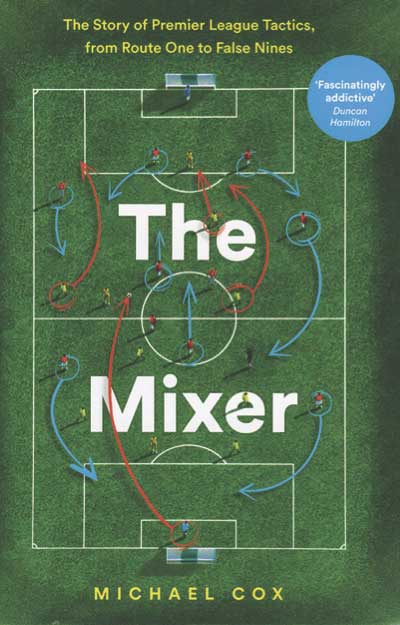
Harper Collins, £16.99
Reviewed by Paul Rees
From WSC 366, August 2017
Buy the book
There’s no getting around it, that is an extremely unappealing title. The implicit threat is of nothing so much as interminable, desert-dry analysis of systems and statistics from straight out of a coaching manual and of interest to no one that isn’t the most profound football bore or a member of author Michael Cox’s immediate family.
Cox, though, has form on his chosen subject. The founder and sole curator of the excellent Zonal Marking website, crucially he matches a knowledge of and passion for the minutiae of football tactics with real writerly craft.
The Mixer is far more readable and insightful than one might reasonably expect and not because it provides detailed dissections of the evolution and application of tactics such as tiki-taka and inverted wingers, though it does that too, but on account of how adeptly Cox is able to relate as much.
A writer first and analyst second, he is canny enough to focus on the human characters at the heart of his narrative. Since the key figures are frequently complex, contentious mavericks, and their individual histories laced with an abundance of conflict, drama and humour, Cox is able to keep his book zipping along at a cracking pace.
That isn’t to say that he offers up any new revelations about the likes of the peacocking Eric Cantona, boorish José Mourinho or obsessive Pep Guardiola, but rather that he presents them with a storyteller’s flair. Similarly, the book’s 25 chapters, one for every Premier League season and with a major tactical shift highlighted in each, covers nothing but familiar ground.
However, Cox at least endeavours to come at it from less well-trodden perspectives. Be that the unheralded role of the players in shaping Arsène Wenger’s revolution at Arsenal in the late-1990s, or the extent of Sam Allardyce’s innovations.
Cox doesn’t always get it right. In establishing the Premier League as a brave and more enlightened dawn for football in England, a rescue from the tactical dark ages into which it had slumped, he barely stops to consider why English teams so dominated European club competition in the 1970s and early 1980s.
As such, while he assuredly traces how from overseas the brightest thinkers on the game and its most technically gifted exponents have latterly brought their influence to bear on our domestic football, The Mixer doesn’t have the context of the same initially going the other way, and in particular via the emphasis placed on possession by the Liverpool sides of that earlier era.
He is also not averse to hyperbole. “Amazing” and “incredible” appear to be his favourite adjectives. It is surely stretching the bounds of reason to claim that prior to their 1994-95 title triumph, it was “amazing” that Blackburn Rovers had not claimed a major trophy since 1928.
These, though, are minor gripes. More pertinently, anyone that can make pressing up the pitch read as absorbingly as the intricate inner workings of a watch, as Cox does here, has done an admirable job.